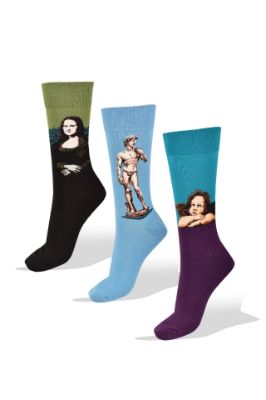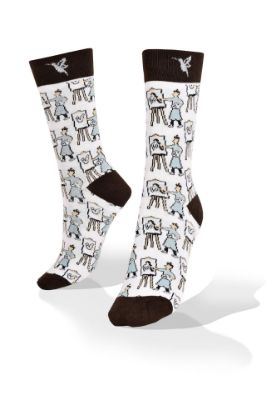Churchill Socks
Winston Churchill had an extensive political career. He served on the Board of Trade, a Secretary of War, a committee on air-defense research, and, most notably, as Prime Minister. With growing concerns over the Nazi threat, public opinion favored Churchill, recognizing him as a wise spokesman for the country. Britain declared war on Germany in September of 1939, and by May 1940, after numerous military miscalculations, Neville Chamberlain resigned from his position as Prime Minister. It was evident that Churchill would be the ideal leader through the war, uniting the nation around a common cause. It was Churchill's primary goal to defeat the Nazis, and he knew the United States was an inevitable ally in this cause. When the Nazis invaded the Soviet Union, Churchill proposed a "grand alliance," adding the USSR into the fold with the US and Great Britain. Churchill, the architect of the Allied alliance, organized the consolidation of British and American military forces and cooperation with the Soviets. Despite his successes, the war proved to be a great burden on the British people, and in 1945, two months after the German surrender, the British people voted Churchill and the Conservative party out of office. Churchill's political career did not end with this defeat, however, he continued his service in parliament. In this post-war position, Churchill's focus turned to the threat of Communism from his former ally, the Soviet Union. In an infamous speech, Churchill described Eastern and Western Europe as being separated by an "Iron Curtain." After maintaining his presence in the British Political sphere, Churchill ran for Prime Minister again and was elected for a second term in 1951. During this tenure, Churchill turned his focus to revitalizing the economy and balancing payments. He also advocated for advances in nuclear technology and authorized the manufacturing of a British hydrogen bomb. In 1953, he was awarded the Order of the Garter and the Nobel Prize for Literature. However, as he aged, his political vigor declined, and he resigned from his position in April 1955. Churchill led a storied political career, characterized by his love for his country and steadfast opposition to threats of fascism and Communism.
- 1
- 2











.jpeg)








